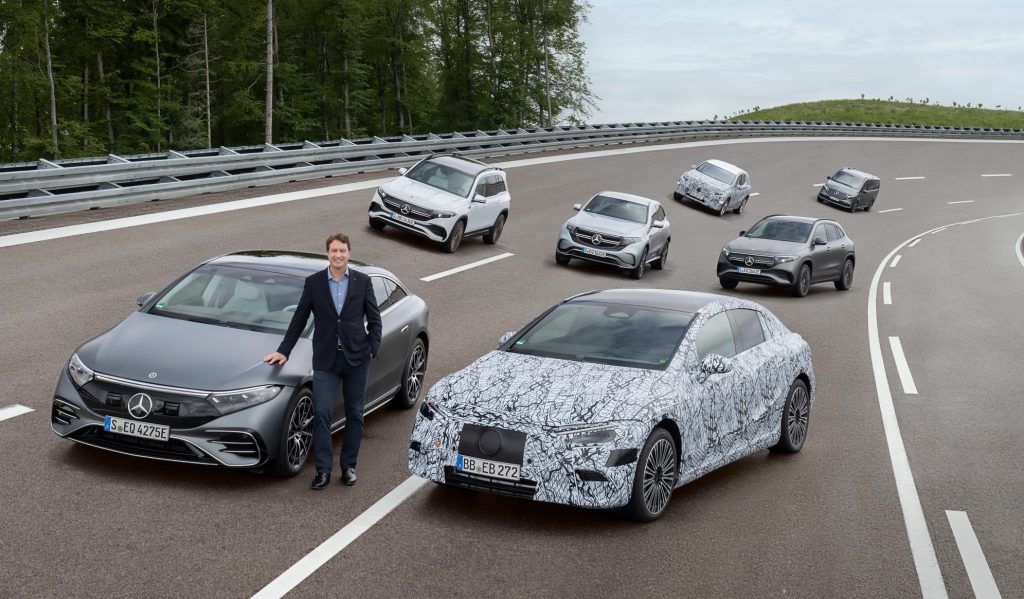
Mercedes Benz is joining a growing list of automakers that are shifting their efforts from internal combustion engines to electric powertrains. Mercedes is now getting serious, by laying down a firm timeline. From 2025, new vehicle architecutres and therefore new vehicle programs would only be exclusively electric.
By 2022, Mercedes-Benz will have battery electric vehicles (BEV) in all segments the company serves. Mercedes-Benz will also install more than 200 Gigawatt hours of battery cell capacity with partners, to be produced at 8 Gigafactories.
This falls shot compares to Tesla’s public plans to install around 3TW of battery capacity by 2030, for use in both vehicles and storage products.
Mercedes-Benz will now accelerate R&D efforts, growing their total investments into battery electric vehicles to over €40 billion (A$63.8 Billion) up between 2022 and 2030.
In a very clear statement around the company’s finances, Mercedes is changing its capital allocation, moving from EV-first to EV-only.
Mercedes expects to create 3,000 new software engineering jobs will be created worldwide.
A key component of an electric vehicle strategy is how you deal with the recharging challenge. Some automakers are partnering with 3rd party networks, while others build out their own infrastructure. Mercedes has announced plans to work with Shell to expand the charging network. This will introduce more than 530,000 AC and DC charging points worldwide. Mercedes owners would see seamless charging without extra steps needed for authentication and payment (ISO 15118).
“The EV shift is picking up speed – especially in the luxury segment, where Mercedes-Benz belongs. The tipping point is getting closer and we will be ready as markets switch to electric-only by the end of this decade,”
This step marks a profound reallocation of capital. By managing this faster transformation while safeguarding our profitability targets, we will ensure the enduring success of Mercedes-Benz. Thanks to our highly qualified and motivated workforce, I am convinced that we will be successful in this exciting new era.”
Ola Källenius, CEO of Daimler AG and Mercedes-Benz AG.
In 2025 Mercedes-Benz will launch three electric-only architectures:
- MB.EA will cover all medium to large size passenger cars, establishing a scalable modular system as the electric backbone for the future EV portfolio.
- AMG.EA will be a dedicated performance electric vehicle platform addressing technology and performance oriented Mercedes-AMG customers.
- VAN.EA ushers in a new era for purpose made electric vans and Light Commercial Vehicles, which will contribute to emission free transportation and cities in the future.
Regarding the batteries used in these vehicle platforms, Mercedes says their next-generation batteries will be highly standardized and suitable for use in more than 90% of all Mercedes-Benz cars and vans while being flexible enough to offer individual solutions to all customers.
With regard to cell manufacturing, Mercedes-Benz intends to team up with new European partners to develop and efficiently produce future cells and modules, a step that ensures that Europe remains at the heart of the auto industry even in an electric era.
Cell production will give Mercedes-Benz the opportunity to transform its established powertrain production network. By continuously integrating the most advanced battery cell technology in cars and vans, Mercedes-Benz aims to increase range during the production lifecycle of a model.
With the next battery generation, Mercedes-Benz will work with partners like SilaNano to further increase energy density by using silicon-carbon composite in the anode. This will allow for unprecedented range and even shorter charging times.
When it comes to solid-state technology, Mercedes-Benz is in talks with partners to develop batteries with even higher energy density and safety.
VISION EQXX (pictured above)
Mercedes-Benz is currently developing the Vision EQXX, an electric car with a real-world range of more than 1,000 kilometers, targeting a single-digit figure for Kwh per 100 kilometers (over 6 miles per Kwh) at normal highway driving speeds.
A multi-disciplinary team including experts from Mercedes-Benz’s F1 High-Performance Powertrain division (HPP) is making rapid progress towards the project’s ambitious goals. The world premiere will be in 2022. Technological advances made with Vision EQXX will be adapted and applied for potential use in new electric architectures.
In terms of Australian availability of electric Mercedes-Benz, it is worth noting that they do provide the caveat of going all-electric by the end of the decade, where market conditions allow.


